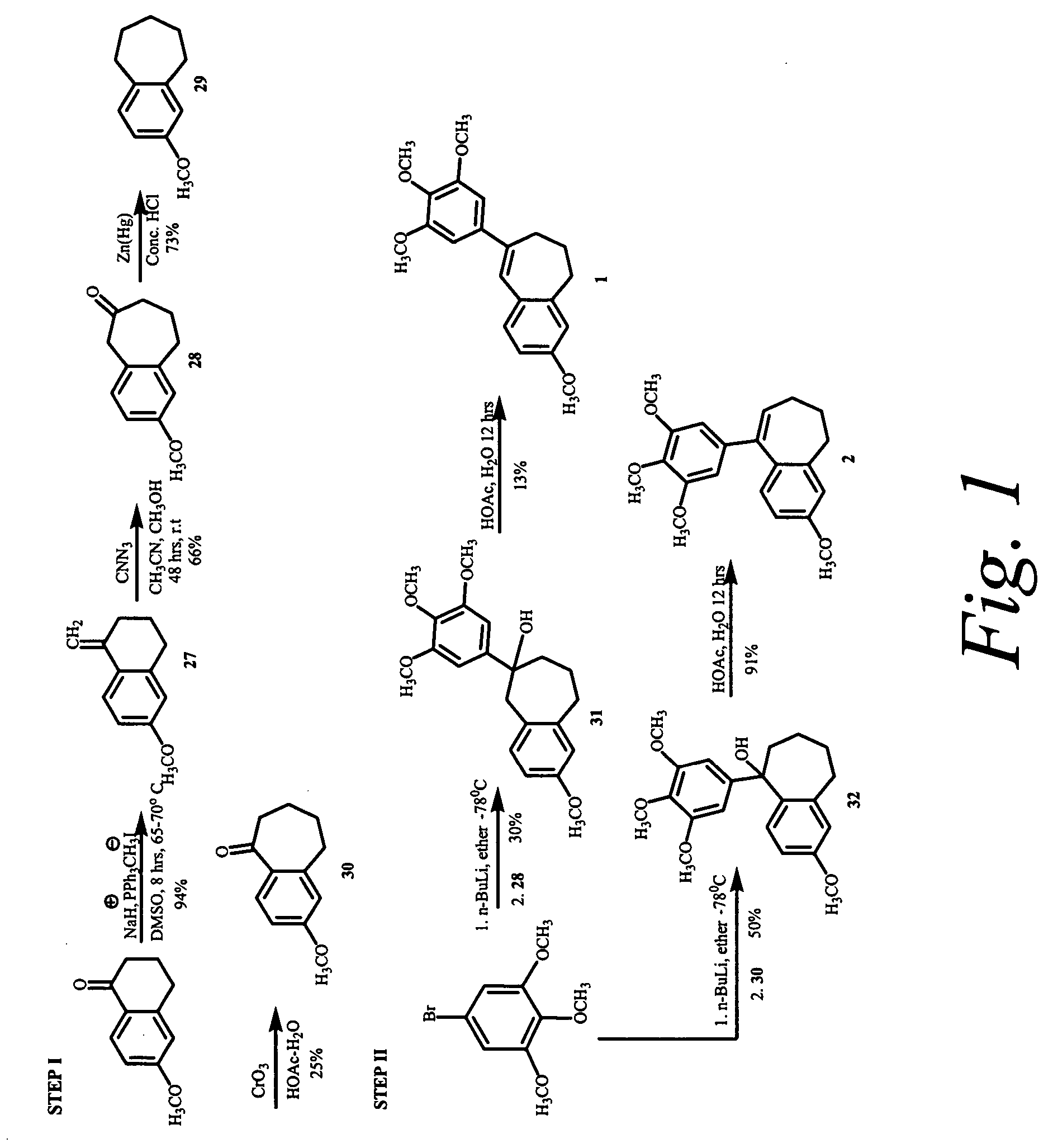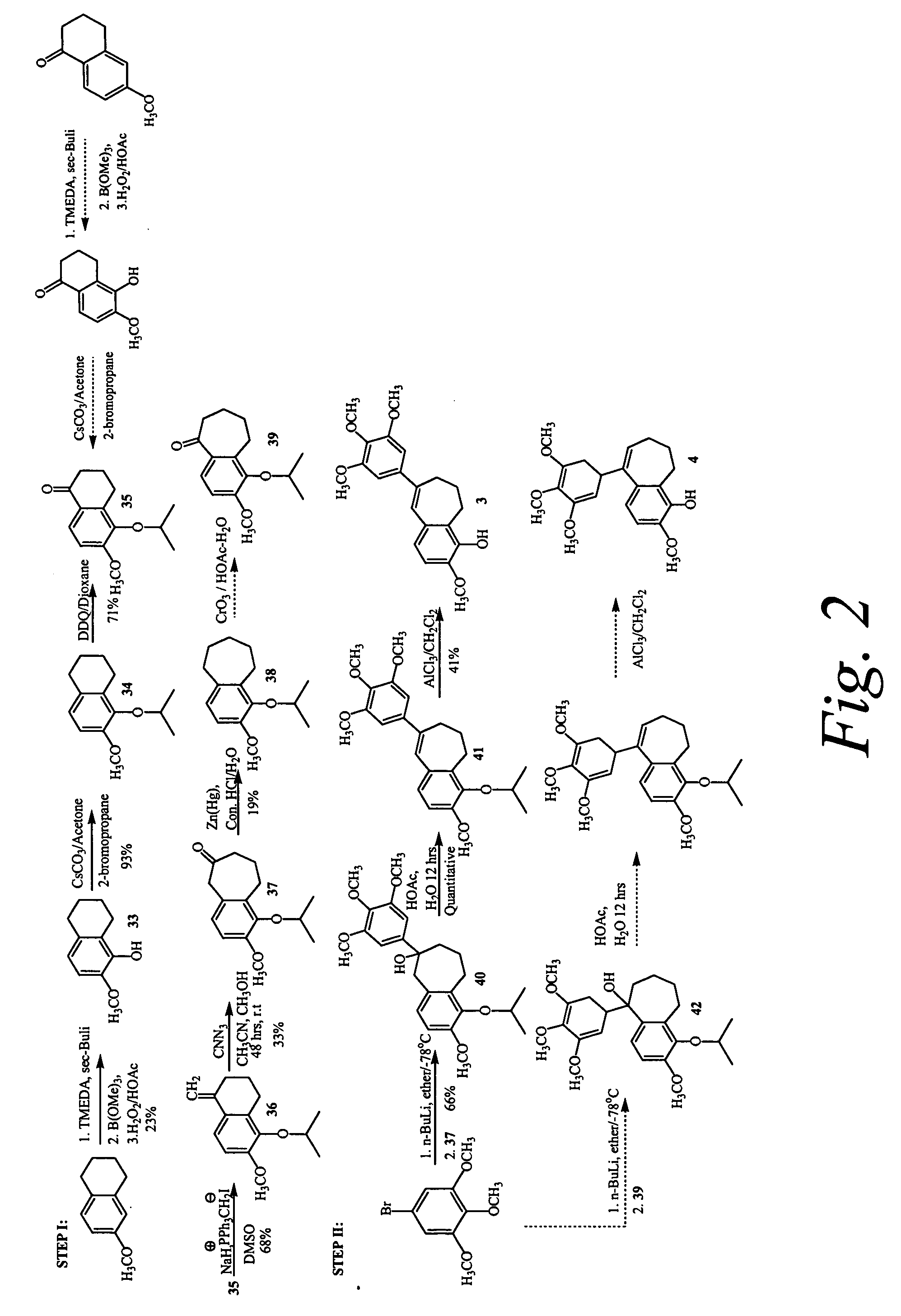Combretastatin analogs with tubulin binding activity
- Summary
- Abstract
- Description
- Claims
- Application Information
AI Technical Summary
Benefits of technology
Problems solved by technology
Method used
Image
Examples
example 1
Synthesis of Representative Combretastatin Analogs
Synthesis of 3-Methoxy-9-(3,4,5-trimethoxy-phenyl)-6,7-dihydro-5H-benzocycloheptene (2; see FIG. 1)
6-Methoxy-1-methylene-1,2,3,4-tetrahydro-naphthalene (27)
[0209] To a dry 500 mL 3-necked round bottom flask equipped with a reflux condenser and magnetic stir bar, was charged sodium hydride (3.0 g, 172.89 mmol). The reaction flask was put under nitrogen, and 35 mL of anhydrous DMSO was added. The reaction mixture was heated to 70-75° C., and stirred at that temperature until the evolution of hydrogen ceased. The reaction mixture was cooled to room temperature and additional 25 mL of DMSO was added. Methyltriphenylphosphonium iodide (46.57 g, 115.26 mmol) was added in portions over a period of 1 h. 25 mL of additional DMSO was added to facilitate easy stirring. After the completion of addition, the reaction mixture was stirred for 20 minutes. 6-methoxytetralone (10.156 g, 57.63 mmol) dissolved in 10 mL of anhydrous DMSO was added to ...
example 2
Synthesis of Optional Linkers
[0246] The compounds of the invention may further comprise a benzoyl substituent in which a carbonyl group is introduced between the core suberene (or dihydronapthalene) ring and the pendant aryl ring. Furthermore, the carbonyl group of the benzoyl substituent can be replaced with an oxygen to generate a new compound which maintains the same or similar biological efficacy with tubulin. These compounds may be prepared by an addition elimination reaction utilizing the trimethoxyphenolic anion as a nucleophile. Other linkage atoms between the aryl-aryl rings are conceivable as well, including thioethers (—S—), secondary alcohols (—CH(OH)—, and methylenes (—CH2-). These compounds are intended to form a one-atom bridge between the substituted aryl and the chromene ring. For example, the secondary alcohols can be created by reduction of corresponding ketones (—C═O)— with sodium borohydride, and methylenes can be created by reduction with trifluoroacetic acid....
example 3
Synthesis of Intermediate I (FIG. 11)
3-hydroxy,4-methoxybromobenzene
[0302] In a 500 mL round bottom flask was charged 2,4-dibromoanisole (5.0 g, 18.8 mmol) followed by 200 mL of dry tetrahydrofuran under nitrogen. The reaction mixture was then cooled to −78° C., and n-butyllithium (16.11 mL, 22.56 mmol) was added dropwise. The reaction mixture was stirred for 30 min at −78° C. The reaction mixture was then warmed to 0° C. and trimethylborate (2.57 mL, 22.56 mmol) was added dropwise. The reaction mixture was stirred at room temperature for 30 min. 5 mL of glacial acetic acid was added followed by 10 mL of 35% wt. hydrogen peroxide in a drop wise fashion. The reaction was allowed to stir 12 h at room temperature. The reaction was quenched with 1 N HCl, extracted with ethylacetate (100×3) and the combined organic phases were dried over Na2SO4, filtered and evaporated under reduced pressure. Purification by column chromatography yielded 1 g (26%) of 3-hydroxy, 4-methoxybromobenzene (w...
PUM
| Property | Measurement | Unit |
|---|---|---|
| Molar density | aaaaa | aaaaa |
| Molar density | aaaaa | aaaaa |
| Molar density | aaaaa | aaaaa |
Abstract
Description
Claims
Application Information
 Login to View More
Login to View More - R&D
- Intellectual Property
- Life Sciences
- Materials
- Tech Scout
- Unparalleled Data Quality
- Higher Quality Content
- 60% Fewer Hallucinations
Browse by: Latest US Patents, China's latest patents, Technical Efficacy Thesaurus, Application Domain, Technology Topic, Popular Technical Reports.
© 2025 PatSnap. All rights reserved.Legal|Privacy policy|Modern Slavery Act Transparency Statement|Sitemap|About US| Contact US: help@patsnap.com



